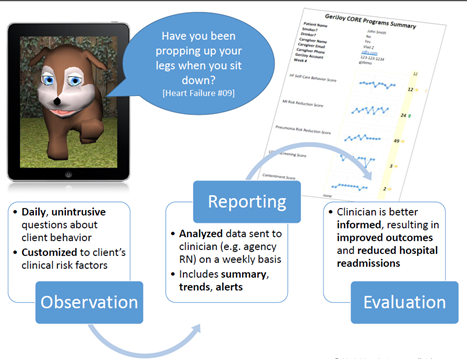GeriJoy’s new CORE program enables its talking pet companion to help clinicians better evaluate and mitigate the primary risk factors needed to reduce hospital readmissions.
Preventable hospital readmissions cost the U.S. health care system an estimated $25 billion annually, according to Pricewaterhouse Coopers. In order to cut down on the number of preventable hospital readmissions, Obamacare’s Medicare Hospital Readmissions Reduction Program charged a total of 2,213 hospitals about $280 million in readmission penalties. These new financial penalties mean that hospitals are now more motivated than ever to refer patients post-discharge to care providers that have the best means to prevent readmissions.
GeriJoy, provider of senior care technology announced today a new program option that enables its talking pet companions to ask clients specialized, recurring questions that help clinicians to better evaluate and mitigate the primary risk factors for hospital readmissions (heart failure, heart attacks, and pneumonia), along with the common chronic conditions of COPD and depression. The new program option will allow GeriJoy to leverage its technology-enabled 24/7 companionship and oversight service to help keep older adults out of hospitals, saving hospitals money and earning post-discharge care providers like home care agencies more referrals.
GeriJoy CORE Program Details
Under the GeriJoy CORE Program (CORE being an acronym for Clinical Observation, Reporting, and Evaluation), GeriJoy’s virtual care companions ask clients specialized questions about their daily behavior, tailored to their clinical risk factors. These observations are analyzed by GeriJoy and reported to clinicians such as a registered nurses or care managers, who use the insight from real-time alerts as well as weekly summaries and trends to better evaluate and mitigate client risk factors for hospital readmission.
The GeriJoy CORE Program focuses on three primary risk factors for preventable hospital readmissions, which hospitals are penalized for under the Affordable Care Act: heart failure, acute myocardial infarction (heart attack), and pneumonia. For example, propping up the legs of a congestive heart failure patient when sitting is an effective way to reduce risk for further complications of heart failure, and one of the questions asked by the GeriJoy CORE Program of heart failure patients is, “Have you been propping up your legs when you sit down?” All observations are based on the latest peer-reviewed research and standardized survey instruments.

Additionally, the program observes client risk factors and status pertaining to two of the most common chronic conditions among seniors: COPD (chronic obstructive pulmonary disorder) and depression. GeriJoy suggested that Alzheimer’s disease and other dementias may soon be included in the GeriJoy CORE Program, through the regular administration of enjoyable cognitive and memory tests.
Improved Clinical Outcomes with Virtual Companion
The key to the success of the GeriJoy CORE Program is the GeriJoy Companion, which takes the form of a lovable dog or cat in a specially configured tablet device, available to an elderly person 24/7. Through the support of GeriJoy’s remote care staff, the pet talks with older adults intelligently and compassionately about topics including family photos, news, and daily routines to provide companionship, stimulation, and family connection with zero technical abilities required.
Under the CORE Program, the GeriJoy Companion asks the client questions each day, throughout the day, customized to the client’s clinical risk factors. Clients do not notice any intrusiveness because only a couple of questions are asked at a time, in the comfort of the client’s own home. Moreover, the questions are asked by an unintimidating, adorable virtual companion, blended with regular conversation.
“The GeriJoy CORE Program is an exciting way for providers to keep their patients from being readmitted to hospitals — it’s not only effective for clinicians, but also engaging and fun for older adults and families,” said Victor Wang, CEO of GeriJoy.
For more information, including GeriJoy CORE Program Specifications, example CORE data/reports, and how to get started as a provider, please contact info(at)gerijoy(dot)com.
